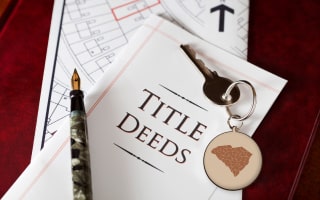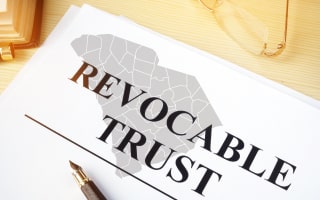How to Find Owners of Properties
in South Carolina

Conducting a property owner search in South Carolina is easy if you look in the right direction. The first way is to check public records available at designated offices. However, for an average person conducting this type of search for the first time, locating the owner of one of the millions of properties in the state could be daunting.
One easier alternative is to get a third-party agent to search for you. Regardless of which way you choose to go, here are some ways to conduct a faster and easier South Carolina property owner search:
Check the Registry of Deeds
In South Carolina, the Registry of Deeds (ROD) records and maintains legal documents related to real estate transactions. This document contains details of both the previous and new owners of properties within the state and is available to the public without any special requirements.
For some counties, the ROD records are available in the county court clerk's office, while others have a separate office operated by other government employees. You can find the address of the ROD office in each county here.
However, if you prefer an online search, you can use the county website instead. Here are some South Carolina county websites you can check:
- Greenville County
- Charleston County
- Richland County
- Horry County
- Spartanburg County
- Lexington County
- York County
- Berkeley County
- Anderson County
- Beaufort County
Search with the Land Records Website
Another way to find the owner of the property free in South Carolina is by searching with the state Land Records website. These records are some of the most complete and accurate records of property owners in South Carolina and all over the country.
It has existed since colonists arrived in the United States and includes information on all real estate transactions, including those between individuals and the government as well as between individuals. South Carolina maintains a website where interested persons can get details of property owners from 1995 to date.
Here are some of the details you can find on the website:
- Indexes from January 3, 1995, to the present
- Scanned images from September 25, 2002, to the present
- Land indexes, images, and plats from December 1990 to the present
- Tax lien indexes and images from July 1994 to the present
To conduct an effective property owner search, here are some information you should get:
- Location of the property
- Date of the transaction
- First and last name of the owner
- Phone number
- Email address
- Parcel ID associated with the owner
Visit the City or Town Assessor's Office
A local assessor's office is home to several types of records that can help track owners of properties within its jurisdiction. Some of these documents include property records, assessment records, tax records, building permits and inspection records, zoning records, historical records, maps and surveys, and land use records.
All these are accessible at the local assessor's office and the designated websites. Here are some local assessor's office websites in South Carolina:
- Greenville County
- Richland County
- Charleston County
- Spartanburg County
- Lexington County
- Berkeley County
- Aiken County
- Anderson County
- York County
- Dorchester County
Check Tax Records
Local assessors store tax records in their offices. These records contain relevant details that can aid your property owner's search in South Carolina, some of which include:
- Property address
- Current owner's name
- Current owner's mailing address
- Historical owners' names
- Legal property description
- Assessed value of the property
- Tax records (including payment history)
- County information
- Recorded documents (deeds, mortgages, etc.)
Once you have any of the details, you can conduct a filtered search on the county's dedicated local assessor's website. Tax records not available online can be accessed by calling or emailing the local assessor's office where these records are or by visiting the office to request the records directly.
With the address or parcel number and a fee demanded, which is rarely demanded, you can get the tax record to find the owner of the property free of charge.
Title Company/Agency
Title companies are third-party organizations that work for homeowners and buyers to ensure smooth and legal transfers of house titles. Their work goes beyond researching ownership details; they also undertake legal checks to confirm that the property in discussion is valid and transferable.
While checking public records allows you to find the owner of the property free of charge, this method will cost you some money. Title agencies in South Carolina and other states typically charge between $300–$400.
Unlike the public records search, which entails flipping through multiple pages, a title company search provides a sorted list of properties in your desired jurisdiction.
There are several other ways to conduct an effective property owner search for little or no cost. You can ask neighbors and locals in the area for details on the property. Alternatively, you can enlist help from real estate lawyers/agents or search with relevant websites.
![]() Use Commercial Services
Use Commercial Services
Commercial services are third-party real estate sites that provide ownership information of all categories of properties throughout the country. Although not as comprehensive as official records, they are one of the fastest and most straightforward ways to search for property ownership.
These commercial third parties, like PropertyChecker, integrate advanced technology with geospatial data, analytics, and other relevant tools to create a streamlined search process. You can use their service to search statewide records, find current and past owners, and uncover the people behind entities and trusts.
Here's a step-by-step guide you can follow to conduct a property search on PropertyChecker:
- Visit the PropertyChecker Website: Navigate to the PropertyChecker website to access property records.
- Enter Search Criteria: Search for properties using the owner's name, address, or contact information. Next, review the system-generated report, noting relevant property insights.
- Review Property Information: Access information about the property owner, including contact details. View past sales data, including sale prices and dates. Find details on loans associated with the property, including amounts and lenders. Review tax assessments, owed taxes, and exemptions. Check for permits issued for renovations or constructions on the property. You can also review foreclosure proceedings or liens against the property.
- Analyze the Data: Use the gathered information to make informed real estate decisions.
What Are the Different Types of Property Ownership in South Carolina?

Property ownership in South Carolina varies, as in most places worldwide. An individual can own properties alone, or jointly with a spouse, or with unrelated parties.
To make an informed decision about your title ownership journey, you need to understand the various ownership styles, how they work, and the scenarios in which each applies. In the long run, the type of ownership structure you adopt will influence several important factors, such as:
- Rights of Ownership
- Transfer of Ownership
- Liability and risks
- Tax implications
- Access to finance
There are several types of property ownership in South Carolina and other U.S. states, each with its own financial and legal implications. The most popular ones include:
- Sole Ownership
- Joint Tenancy
- Tenancy by the Entirety
- Tenancy in Common
- Condominium Ownership
Below is a detailed rundown of how each works, their benefits, as well as their implications:
| Ownership Type | Description | Benefits | Implications |
|---|---|---|---|
| Sole Ownership | One person has the legal title to a property. | It gives the owner complete control over the property and supports simple decision-making. | No automatic transfer upon the death of the sole owner. The property goes through probate. |
| Joint Tenancy | This ownership structure enables two or more persons to own a property jointly. | Right of survivorship: automatic transfer to surviving owners upon the death of one of the joint owners. | All owners must agree to sell. It also requires equal share ownership amongst all tenants. |
| Tenancy by the Entirety | This arrangement allows married couples or domestic partners to own property together, not in shares, but jointly (100% and not 50:50) | It offers protection from creditors of one spouse. The arrangement also allows automatic transfer to the surviving spouse. | It is only available to married couples; neither spouse can sell without the consent of the other. |
| Tenancy in Common | A shared ownership structure allows persons to own property jointly. | It supports flexible share ownership and allows owners to pass interest to heirs. | There is no right of survivorship; interests can be sold without the consent of other owners. |
| Condominium Ownership | This allows a person to own a share in a building complex but share common amenities with other owners. | Relatively cheaper. It allows for ownership of a specific unit. There's shared responsibility for common areas. | Monthly maintenance fees after purchase; rules set by the homeowners' association can affect use. |
| Cooperative Ownership | Here, individuals own shares in a corporation that owns a property. | Owners have shareholder rights in the corporation owning the property. It is cheaper than outright ownership. | Limited control over property decisions; owners must adhere to cooperative rules. |
| Trust Ownership | In this ownership system, a trust oversees a property on behalf of a third party, the beneficiary. | It does not require probate. | Requires careful setup; the trustee has control over property management. |
| Life Estate | Here, a person gives their property to another, but the recipient does not get full ownership until the giver's death. | Right to use property during lifetime; automatic transfer to remainderman upon death. | Owners cannot sell without the remainderman's consent. Also, the value of a life estate can complicate financial matters. |
Finding the Owner of a Trust or Corporation that Owns Properties in South Carolina

Real estate ownership is not limited to individual titles. Legal entities like a trust, C or S corporations, a partnership, and limited liability companies can also own properties. However, finding the owner of a trust or corporation-owned property is much more technical than finding the owner of an individual-owned property.
To navigate the complexities of property ownership and provide insights into the legal structures involved, you can enlist the professional help of real estate attorneys or title companies. But if you choose to handle the job yourself, here are the steps to follow:
Cross-reference Public Records
Public records such as deeds, mortgages, and property tax records contain a variety of information that can help with a real estate ownership search. Mortgages provide details of liens or loans associated with properties. Deeds, on the other hand, identify the legal owner, while property tax records tie the record of tax generated to the entity or corporation with the property title.
You can access these records at the designated government offices highlighted earlier.
Searching Business Databases
LexisNexis, Westlaw, and other business research tools place names on property titles. They also detail the entity's registration, ownership structure, and financial status. These tools are handy and will aid your search. For a localized search, you can also lay your hands on local business directories, such as those maintained by the local chamber of commerce.
On a more specific level, below are some ways to find the owner of a trust or corporation that owns properties in South Carolina:
Finding the Owner of a Trust in South Carolina
Here's a quick four-step guide you can use to find trust owners in South Carolina:
- Review the Trust Document: Obtain and examine the trust document. It will typically list the trustee and the beneficiaries. The trustee is the person or entity managing the trust and its assets.
- Check Public Records: Visit the county recorder's office if the trust owns real estate. Look for deeds listing the trust as the owner and name the trustee.
- Contact the Trustee: Once you identify the trustee, reach out to them directly for details about the trust's ownership and beneficiaries.
- Consult Legal Professionals: If you face challenges or require detailed information, engage a real estate attorney or a title company to help navigate the trust's ownership complexities.
Finding the Owner of an LLC in South Carolina
To find LLC owners, here's what to do:
- Visit the South Carolina Secretary of State's Website: Access the Corporation Search tool available on the Secretary of State's website.
- Search for the LLC Name: Enter the LLC's name into the search tool to find matching entities.
- Access Business Documents: Click on the LLC's name to retrieve documents like the Articles of Organization, which should list the members or managers of the LLC.
- Request Additional Information: If online searches are insufficient, file a public records request with the Secretary of State's office for more owner details.
- Explore Alternative Sources: Use local business directories or platforms like LinkedIn to gather further information about the LLC and its members.
Finding the Owner of a Corporation in South Carolina
A corporation search follows a similar approach to an LLC search. Here are the processes involved:
- South Carolina Secretary of State's Corporation Search: Access theCorporation Search tool from their website.
- Search for the Corporation Name: Type in the name of the corporation to locate it.
- Review Corporate Documents: Access documents like the Articles of Incorporation or annual reports by clicking on the corporation's name. These documents list officers and directors who might be the owners or have significant control.
- Request Further Information: If the online information isn't enough, submit a public records request to the Secretary of State's office for detailed ownership data.
- Utilize Business Research Tools: For deeper insights, employ business databases like LexisNexis or Westlaw to explore the corporation's ownership structure and financial details.
Common Methods of Property Transfer in South Carolina

Property deeds are vital legal documents that transfer property ownership from a seller to a buyer or another recipient. They identify the rights and liabilities of the parties to the agreement and any legal protection that applies to them.
Here's an overview of the common types of property deeds you'll encounter in South Carolina:
-
Warranty Deeds
Warranty deeds are either general or special. See how each works and the main differences between them below:
- General Warranty Deed: This type of deed provides the highest level of protection for the buyer. The seller guarantees that they are the true owner with the right to sell the property and promises to defend the buyer against any future claims or title defects, no matter when they occur.
- Special Warranty Deed: Here, the seller's warranty is limited. They assure the buyer that no title issues have arisen during their ownership. However, they do not provide any coverage or warranties for events that occurred before their ownership.
-
Quitclaim Deeds
This deed does not offer any warranty or protection to the buyer. It simply transfers whatever interest the seller might have in the property without guaranteeing its validity. The quitclaim deed is often used for transferring property within families or between spouses where the title isn't likely to be contested.
-
Deed of Trust
A deed of trust is commonly used in real estate financing. It is a legal agreement that establishes a security interest in real estate between a lender, a borrower, and a trustee. Here, the trustee holds the property title as security for the loan. If the borrower defaults, the lender can initiate foreclosure without court involvement.
Other types of property deeds that may be applicable in South Carolina include:
- Grant Deeds
- Bargain and Sale Deeds
- Mortgage Deeds
Step-by-Step Guide to Property Transfer in South Carolina

Understanding the legal and administrative procedures involved in property transfer can help avoid unnecessary bottlenecks. If you get the steps right, you are less likely to fall prey to fraudulent merchants or other legal difficulties.
For a typical property transaction in South Carolina, here are some of the steps involved:
- Determine the Type of Property Transfer: Understand whether it's a sale, gift, or another type of transfer. This dictates the legal steps and the type of deed needed.
- Conduct a Title Search: A title search verifies that the seller legally owns the property and can transfer it free of liens or encumbrances. Expect costs from $100 to $250 for residential properties, with commercial properties costing around $300.
- Prepare the Deed: Hire an attorney to draft the deed. This document legally evidences the transfer. Attorney fees can range from $400 to $1,000.
- Pay Transfer Taxes: In South Carolina, sellers must pay a transfer tax of $1 for every $1,000 sale price, with potential additional local taxes.
- Record the Deed: The deed must be filed with the county's Register of Deeds to make the transfer official.
-
Review and Recording: After the transfer, you'll need to:
- Submit the deed for recording at the Register of Deeds office.
- Pay a filing fee, typically $10 for the first page and $3 for each additional page.
- Receive a receipt proving the deed has been recorded.
- Update Records: Inform relevant agencies about the change in ownership to ensure all property-related mail goes to the new owner.
- Obtain Title Insurance: Though not mandatory, title insurance is advisable, costing between 0.5% and 1% of the property's sales price. It protects against fraud, scams, and unforeseen liens.
Property Ownership Guide
- How to Find Owners of Properties in South Carolina
- What Are the Different Types of Property Ownership in South Carolina?
- Finding the Owner of a Trust or Corporation that Owns Properties in South Carolina
- Common Methods of Property Transfer in South Carolina
- Step-by-Step Guide to Property Transfer in South Carolina
South Carolina Homeowner Lookup
- Owner(s)
- Deed Records
- Loans & Liens
- Values
- Taxes
- Building Permits
- Purchase History
- Property Details
- And More!
Property Ownership Guide
- How to Find Owners of Properties in South Carolina
- What Are the Different Types of Property Ownership in South Carolina?
- Finding the Owner of a Trust or Corporation that Owns Properties in South Carolina
- Common Methods of Property Transfer in South Carolina
- Step-by-Step Guide to Property Transfer in South Carolina